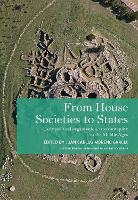


|
|
|
books
| book details |
From House Societies to States: Early Political Organisation, From Antiquity to the Middle Ages
Edited by Juan Carlos Moreno Garcia

|
| on special |
normal price: R 2 176.95
Price: R 2 067.95
|
| book description |
The organisation and characteristics of early and ancient states have become the focus of a renewed interest from archaeologists, ancient historians and anthropologists in recent years. On the one hand, neo-evolutionary schemas of political transformation find it difficult to define some of their most basic concepts, such as ‘chiefdom’, ‘complex chiefdom’ and ‘state’, not to mention the transition between them. On the other hand, teleological interpretations based on linear dynamics, from less to increasingly more complex political structures, in successive steps, impose biased and too rigid views on the available evidence. In fact, recent research stresses the existence of other forms of socio-political organisation, less vertically integrated and more heterarchical, that proved highly successful and resilient in the long term in tying together social groups. What is more, such forms quite often represented the basic blocks on which states were built and that managed to survive once states collapsed. Finally, nomadic, maritime and mountain populations provide fascinating examples of societies that experienced alternative forms of political organisation, sometimes on a seasonal basis. In other cases, their consideration as ‘marginal’ populations that cultivated specialised skills ensured them a certain degree of autonomy when living either within or at the borders of states.  This book explores such small-scale socio-political organisations, their potential and the historical trajectories they stimulated. A selection of historical case studies from different regions of the world may help rethink current concepts and views about the emergence and organisation of political complexity and the mechanisms that prevented, occasionally, the emergence of solid polities. They may also cast some light over trajectories of historical transformation, still poorly understood as are the limits of effective state power. This book explores the importance of comparative research and long-term historical perspectives to avoid simplistic interpretations, based on the characteristics of modern Western states abusively used retrospectively.
| product details |

Normally shipped |
Publisher | Oxbow Books
Published date | 15 Oct 2022
Language |
Format | Hardback
Pages | 312
Dimensions | 240 x 170 x 0mm (L x W x H)
Weight | 0g
ISBN | 978-1-7892-5862-2
Readership Age |
BISAC | history / ancient / general
| other options |

Normally shipped |
Readership Age |
Normal Price | R 2 884.95
Price | R 2 739.95
| on special |
|
|
|
To view the items in your trolley please sign in.
| sign in |
|
|
|
| specials |
|
|
An epic love story with the pulse of a thriller that asks: what would you risk for a second chance at first love?
|

|
Mason Coile
Paperback / softback
224 pages
was: R 520.95
now: R 468.95
|
A terrifying locked-room mystery set in a remote outpost on Mars.
|
|
|
|
|